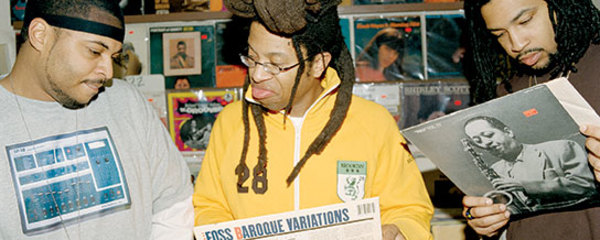The Perceptionists: Triple Play
The vibe in Boston is so good at the moment,” The Perceptionists’ Mr. Lif says […]
The Perceptionists: Triple Play
The vibe in Boston is so good at the moment,” The Perceptionists’ Mr. Lif says […]

The vibe in Boston is so good at the moment,” The Perceptionists’ Mr. Lif says of his hometown. “It’s an ill time to be here–the region is just synonymous with excellence right now.”
Lif isn’t talking about the attention the city’s historically ignored hip-hop scene has been receiving lately–he’s referring to the success of the Boston Red Sox and New England Patriots, whose recent championships have helped redefine a city often preoccupied with the failure of its sports franchises.
The MC, born Jeffrey Haynes, might be best known as the dreadlocked, pro-black arm of the Definitive Jux camp, or as Boston’s most politically conscious MC, but–like his Perceptionists cohorts Akrobatik (Jared Bridgeman) and DJ Fakts-One (Jason Goler)–he’s a bit of a jock at heart, too. All three played high-school football; Lif, who also played nine years of organized hockey, was even recruited to play lacrosse by Colgate University.
So it’s fitting that, despite the politically-charged anthems (like the Bush-baiting single “Memorial Day”) on the trio’s upcoming Definitive Jux LP, Black Dialogue, the group is making inroads to more mainstream audiences with “The Razor,” a mixtape-and-internet-only ode to the Patriots that’s gotten play at home games and even brought team owner Bob Kraft to a Perceptionists show in Cambridge.
In fact, it’s their possession of Patriots tickets for the following day that’s got Akrobatik spending New Year’s night 2005 at Lif’s pad, a basement apartment underneath his parents’ house in suburban Dedham. “I predicted the Red Sox in Game 7 on stage at CMJ in New York and got booed,” Ak recalls with a laugh while checking Lif’s Ensoniq EPS for a beat Lif’s just produced for the group. “And what happened?”
While athletic victory might be the source of Boston area brotherhood, the same can’t be said for the city’s hip-hop scene–despite what you may have heard. “Hip-hop in Boston is actually divided and busted up,” explains Akrobatik. “There is a whole side that most people don’t know about: talented artists that are having a hard time being heard,” he adds, citing unsung street MCs like Dre Robinson and Smoke Bulga. “People say Boston is Akrobatik, Lif, Esoteric, Krumbsnatcha, and Edo. G and ignore the whole side of Boston that doesn’t have the fanbase rooted in the college scene. Unlike a lot of other major cities, Boston doesn’t have a [tight-]knit black community,” says Ak. “It is very small and in some ways neglected.”
Despite their billing as a Boston “supergroup” of sorts, the members of The Perceptionists–all of whom have been collaborating together since the days of Fakts’ WERS radio show in the late ‘90s–say their emergence as a unit has nothing to do with repping the wider picture of their hometown. “I plan to move out in the next year or so,” Akrobatik says matter-of-factly. “It doesn’t have anything to do with rap music–I have just been here my whole life. I am not trying to ‘blow up,’ I am just trying to make music with my people and hopefully our work ethic will provide us with some reward for that.”
Nonetheless, there is a perception around the city that, like its sports franchises, Boston’s hip-hop scene is finally thriving–that it’s no longer the place Guru had to abandon for Brooklyn in order to make it as an MC. This past November, Boston hip-hop father figure Edo. G released arguably the best album of his 15-year-career in My Own Worst Enemy, a 10-song back-to-basics LP produced primarily by Pete Rock. Just two months earlier, Insight, an up-and-coming MC/producer from the same Roxbury neighborhood as Edo, released The Blast Radius (on local institution Brick Records) to almost uniformly positive reviews. MC/DJ/producer Edan, a transplant from Maryland who scored a leftfield hit in 2002 with the old-school revisionist LP, Primitive Plus, recently completed its even more distinctive follow-up, Beauty and the Beat.And director Scott Limanek’s Boston Beats and Rhymes, a documentary on the city’s hip-hop circuit featuring the aforementioned MCs, began screening around the city last summer.
All of which sets the stage for Black Dialogue, perhaps the most anticipated Boston hip-hop record in recent memory.
“It was always a plan that after we got our solo albums done we’d do an album, even before the name came along,” says Fakts, whose Long Range LPis still awaiting release by Coup D’Etat Records. (I Phantom, Lif’s first official LP after nearly half a dozen EPs and a live record, appeared on Def Jux in 2002; Akrobatik’s Balance arrived via Coup D’Etat in 2003).
Produced by a four-man committee of Fakts-One, El-P, Willie Evans, Jr., and 19-year-old prodigy Cyrus Tha Great (who rocks a Joy Division sample into the album’s standout track, “What Have We Got To Lose?”), Black Dialogue is the sort of chaotic-yet-cohesive debut you might expect from a trio of friends who’ve been waiting nearly 10 years to make an album together.
The record is alternately serious (“What Have We Got To Lose?” calls for revolt against the current US government) and playful (Digital Underground’s Humpty Hump stops by “Career Finders” to help the crew run an employment service to get ignorance-promoting thugs out of rap). It doesn’t stray from expected themes, but it isn’t predictable either. Aware that the album’s audience will likely be predominantly white, Akrobatik says the album’s title and content represent an effort to reconnect with an urban, black audience.
“We’re making music for the people we want to affect, regardless of the fact that most of them won’t get to hear it,” he says. “What if they get to hear it 10 years from now? What if something happens that makes it so that millions are hearing our music? Then this is the stuff we want to be saying.”

